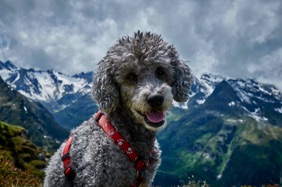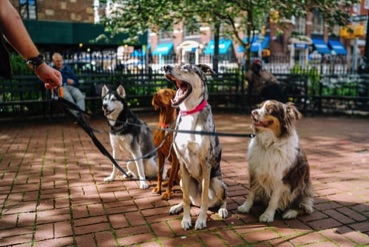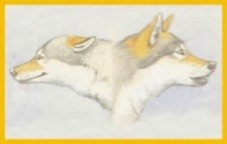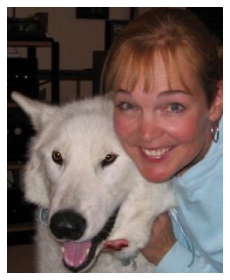Dogs have a puppy license until they are about 6 months old. Before it expires, older well socialized dogs realize pups haven’t learned all of the doggie etiquette yet, and will go about teaching them gently. After the license expires, the older dogs assume pups have had enough time to learn and are now just being rude when they do something wrong. Then they won’t be so kind in return. That is why it is important to do a lot of socialization before pups turn 6 months old. Still let your dog continue to socialize afterwards as well because what he doesn’t use, he will loose.
The safest way to socialize a very young puppy is to have him play in a confined yard with your friends’ dogs who are well socialized and who have had all of their shots. Once a puppy has had his last series of shots, he can safely attend a puppy socialization class or a well supervised doggie daycare. Dog parks unfortunately are risky as there can be aggressive dogs there. Especially small dogs run the risk of getting killed or seriously hurt in dog parks.
When your dog is well socialized, he will be a well adjusted, happy, friendly, diplomatic dog whom you can take with you anywhere without worries.

To teach puppies good social skills, it's important not to just throw a bunch of puppies or dogs together and let them have a free for all. The pups with an outgoing personality would just overwhelm the shy pups and add to their negative glasses. Then the shy pups would get growly, adding to the negative glasses of the outgoing pups. Therefore, by way of strict supervision and interfering at the proper times, we need to teach the outgoing puppies to tone it down and coax the shy puppies out of their shells gradually. That way we can be sure that we are only filling up positive glasses for everyone, and that everyone is learning to be diplomatic. If your parents would have let your siblings do everything to you they wanted to, you most likely wouldn’t be friends with them today.
Socializing To Other Dogs
Dogs have their own language of which the signals are preprogrammed genetically. How and when to use those signals however, to be diplomatic members of doggie society, can only be learned by a lot of play and interaction. Play has everything to do with learning these social skills.
Of course we only want your dog to fill up his positive glasses here too. That means that you want to be very selective about who your dog gets to play with. Only puppies and well socialized friendly dogs will do.






This article is a summary only of how to socialize your dog.
For more information please call or text (303) 910-3931
Disclaimer: Please note that the information herein is provided as a free service. It does not create any form of legal or professional relationship and Affection & Praise Family Dog Training, Inc. does not accept any liability or responsibility for any action taken or avoided on the basis of information provided. It is dangerous to rely on generalized information or guidance. You should always seek independent professional advice in order that it can be tailored to your own individual circumstances.
Proper Dog Socialization
Proper socialization is very important as it has a huge influence over what kind of personality Rover will have as an adult. Will Rover be aggressive or friendly, Dr. Jekyll or Mr. Hyde? There actually are three things that determine Rover's adult personality:
- the temperament he was born with: shy or outgoing?
- how well he was socialized as a puppy
- how he is treated the remainder of his life
Rover learns to predict good or bad things
Not only does Rover learn by the consequences that follow his behavior, as in behavior/obedience training (see the article on how dog training works), he also learns by association. The easiest way to picture this is that each person, situation, or context has two glasses, a positive and a negative one.
Every time something happens that Rover likes, his positive glass fills up a bit and every time something happens that Rover doesn’t like or that scares him, his negative glass fills up. Unfortunately the negative glass fills up quicker than the positive glass. Just like us, Rover needs a lot of good experiences to compensate for one negative one.
If a Rover's positive glass ends up fuller with regard to a person, situation or context, his behavior will be happy-go-lucky, friendly, approaching, and trusting. But if his negative glass ends up being fuller, or his glasses remain empty as in lack of socialization, he will display anxiety, fear, defensive aggression, avoidance, escape, redirected aggression, and depression. This learning by association teaches Rover whether a person, situation, or context predicts something good or whether it predicts something bad or scary, and Rover will then act accordingly.
The four F's
If Rover gets confronted with something that he has a fuller negative glass for, he has a choice of four behavioral strategies: flirt, freeze, fight and flight.
Flirt: This strategy is only used by confident dogs. Rover will act playful and/or very diplomatic, showing lots of appeasement gestures in order to diffuse a tense situation.
Freeze: You will only see this strategy if Rover feels completely overpowered. For instance, a veterinarian may take a fear aggressive dog to the back where the dog will be surrounded by unfamiliar people. This will make the dog less likely to bite. If the vet would try to handle the dog in front of their person, the dog might very well think: "my mom and I together can overpower this vet before he sticks a thermometer up my bum."
Fight and Flight: These strategies are intended to increase the distance between Rover and what he is uncomfortable with. During flight Rover increases the distance by removing himself from the scary situation. Fight also aims to increase the distance, but this time Rover is trying to make the offending party back up to a distance where Rover can be comfortable again, by staring, lunging, charging, barking, growling or snarling.
Whenever we see Rover use the strategies of Flirt and Flight, we want to praise Rover profusely and reinforce those behaviors. The worst that could happen is for Rover to think that Fight works better than anything else.
For instance: your toddler wants to hug and pet Rover. Rover isn't in the mood and tries to get away, but your toddles keeps following Rover. Clearly, the strategy of Flight isn't working. So Rover tries another strategy, Fight: he turns around and snaps at your toddler.
Ideally, we don't want Rover to have to resort to the above behaviors at all. Therefore it is important that we protect Rover from bad experiences, and that we fill up as many positive glasses, as full as we can get them. The fuller the positive glasses are, the more bomb proof Rover's personality will be.
What is socialization?
It was previously thought that socialization was the process of just exposing young puppies to anything and everything that they would encounter later in life. Now we know that just exposing them is not enough. We need to make sure that those exposures are positive, that we are filling up positive glasses. Otherwise we still end up with problems.
For instance, say that we need to socialize two puppies. Number 1’s temperament is very outgoing, and Number 2 is rather shy to begin with. Every time #1 meets a new person, he thinks “great, a new person, my favorite!” A deposit in the positive glass. #2 thinks, “ewe a new person, where can I hide?” A deposit in the negative glass. When we repeat this a lot, #1 will end up with full positive glasses all over the place, while #2 will have full negative glasses, and could become fear aggressive.
What this means is that we have to adjust our socialization to the temperament of the pup. With #2 you would proceed more gradually and add positive things like treats and talking in a happy tone of voice. If #2 gets treats from a lot of new people, he would learn that new people predict good things.
The Numbers Game
The reason we want to fill up as many positive glasses as possible, as full as we can get them, is as follows:
Suppose Rover has had 100,000 good experiences with other dogs. Then one day he is attacked by a German Shepherd. He will most likely associate the bad experience with that dog only and will show avoidance or aggression toward that dog only.
If Rover has had 1000 good experiences with other dogs, he now might have issues with all dogs that have pointy ears and snouts and look like German Shepherds.
If Rover has had 100 good experiences with other dogs, he now might have issues with all big dogs.
And if Rover has had only 10 good experiences, he now will want to avoid other dogs or be dog aggressive across the board.
Therefore it is important that we fill up as many positive glasses, as full as we can get them. The fuller the positive glasses are, the more bomb proof Rover's personality will be.
For All Dogs
To have a well adjusted dog, it’s a good idea to especially add a lot of positive experiences (such as treats, your dog’s regular food, happy talk, or play) to things that dogs normally don’t like.
Here is a short list:
-being petted on top of the head or body (a threat in dog language)
-having their feet touched and nails clipped
-having their mouth and ears examined
-being lifted off the ground
-slippery surfaces: bathtubs, vet tables
-baths (water in eyes, weird flowery smell, and removal of pack smell so they have to go and roll on everything afterwards to smell like themselves again)
-having their food, bones and toys taken away
-going to the vet (needles, thermometer up the butt)
-being hugged or restrained
-being stared at (a threat in dog language)
-people hugging/wrestling (dog lingo: they are going to fight)
-having unfamiliar dogs come onto their territory
-having unfamiliar people come onto their territory, especially the mailman
It’s also a good idea to imitate vet exams at home while giving your dog his regular food or treats.
When you live with young children, you really need to step this up. Repeatedly do everything you think your children might do to your dog, while adding treats. Child proofing Rover is really all about teaching him to be a masochist, associating pain with pleasure. That way if a toddler trips over Rover or pulls his hair, Rover won’t be as quick to react.
positive glass
negative glass
positive glass
negative glass
Happy Go Lucky Behavior
- Anxiety
- Fear
- Aggression
- Avoidance
